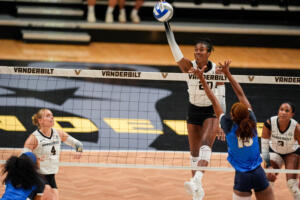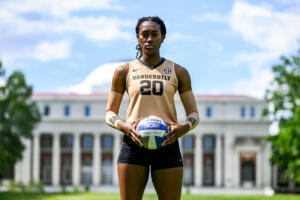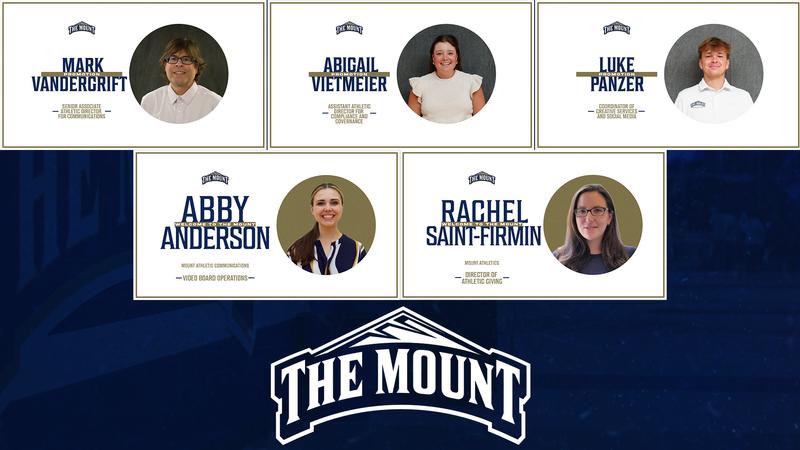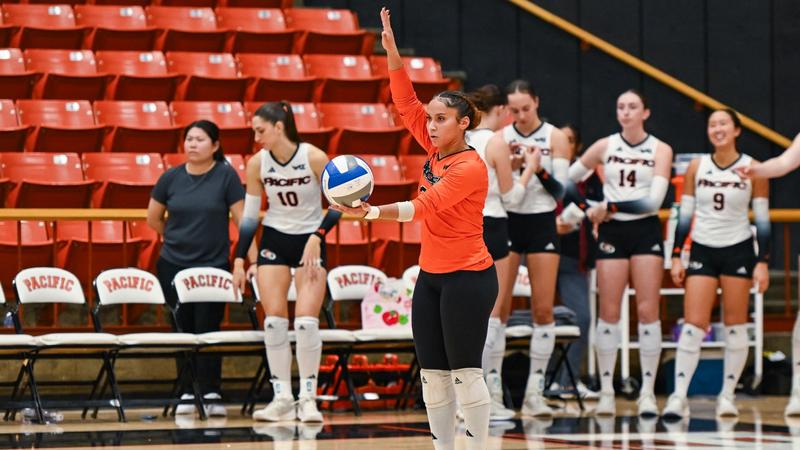NASHVILLE, Tenn. — Just because you choose to be first doesn’t mean you ignore the lessons of those who came before you. Especially when one of them is your mother.
Many Vanderbilt fans don’t yet know Jackie Moore. That’s all right. As the volleyball program takes the court for the first time in more than 40 years, fans are still getting to know these Commodores. But here’s a simple trick for spotting Moore in the early going: look for the player leaping higher—and getting there sooner—than just about anyone else on the court.
A 6-foot-1 senior middle and daughter of former NCAA volleyball All-American Angelica Moore and niece of WNBA pioneer Kym Hampton, Jackie was a two-time first-team All-West Coast Conference selection at Loyola Marymount. After excelling at the mid-major level, she wanted something more out of her final season, something new.
And, well, it doesn’t get newer than the SEC’s newest program.
To challenge herself against the best—on SEC volleyball courts and, as an aspiring lawyer, in classrooms that will prepare her for the other kind—she dared to be bold. She stepped outside her comfort zone. Left home and flew halfway across the country to start anew.
Decades earlier, around the same time that the first generation of Vanderbilt volleyball student-athletes were taking the court, Angelica Moore left her home in East St. Louis, Illinois, and boarded the first flight of her life, bound for California and a volleyball scholarship.
“Knowing my mom took that leap of faith instilled something in me,” Moore said. “If she could do that as a freshman in college, with all those other factors, then I can come to Vanderbilt going into my senior year. I believe her courage influenced my courage. Having strong women who have also been involved in sports and created really successful careers for themselves is something that has been super impactful for me.”
The future brought Jackie to Vanderbilt. She wants to become the best version of herself on the court. She wants to be a leader setting up teammates for success for years to come. Beyond volleyball, she wants to learn how to speak up for those who need a louder voice. For her, taking on the future is the best way to honor the past.

A Mother’s Path
Growing up in East St. Louis, one of the poorest cities in the country then and now, Angelica Moore was raised to value education above all else. For someone who excelled in volleyball, basketball and track and field, sports were initially a useful means to that greater end. Now the Director of Admissions for the University of California Office of the President, she had never been to the West Coast when former San Diego State volleyball head coach and AVCA Hall of Famer Rudy Suwara came to East St. Louis and offered her a scholarship after seeing her play one high school game—a basketball game. Tipped off by a basketball colleague, after Angelica had expressed her preference for playing volleyball in college, Suwara saw elite athleticism and figured coaching could handle the rest.
“I called it my ticket to a higher quality and foundation building for my family,” Angelica recalled.
She picked volleyball over basketball, in part and in full candor, because she thought it would be easier and less of a distraction as she worked toward her degree. She quickly learned that people took their volleyball rather more seriously in California than they had in East St. Louis. Playing Division I volleyball was hard. Living in a community wholly unlike the only one she had ever known was hard. She felt homesick. But as the months went on, and as her all-around game blossomed and she regularly played six rotations, she grew to love the sport that had originally been more a marriage of convenience.
She recorded 52 kills in a 1987 match against Fresno State, an NCAA Division I record for a five-set match that stood for more than a decade. Her mark is still tied for third all time, and in this rally scoring era, only one player this century has eclipsed the 50-kill threshold. An All-American at San Diego State, who also returned to the basketball court for one season as she completed her degree, she went on to play professional volleyball. She helped pioneer a fledgling domestic league in this country and eventually followed the sport as far afield as Germany.
She returned stateside, entered higher education administration, earned her master’s and returned to California (she would go on to earn a doctorate in education in 2013). Volleyball was behind her by the time Jackie arrived on the scene. But the stories lived on.
“The amount of times that I would just casually mention that my mom had the kill record—and she was a middle, mind you, and that’s my position,” Jackie said. “My mom shaped my perception of athletics because she’s the one who got me started in all my sports and just encouraged me to do those types of things.”
A Daughter’s Leap of Faith
Like her mom, Jackie grew up balancing a diversified sports portfolio. She played a lot of basketball, especially early, inspired not just by Angelica’s two-sport exploits but also Hampton. Her aunt on her dad’s side was already a decorated professional abroad by the time she took part in the WNBA’s inaugural season. Some of Jackie’s most formative athletic experiences came on basketball courts, often with her cousin A’riel Jackson, Hampton’s daughter and now a member of the Auburn women’s basketball team.
The dual interests are part of why Vanderbilt head coach Anders Nelson described Jackie as a volleyball “late bloomer”—she opted for “raw” to describe her arrival in the college game. Amid the ever-expanding and intensive youth sports scene, she didn’t play high-level club volleyball until long after many of her peers. Angelica didn’t see the point in spending oodles of money—and it often takes a lot of money these days—to join an elite club before Jackie was even in high school. She knew her daughter was a special athlete, and if Jackie decided she wanted to get serious about volleyball, she would be able to catch up.
It’s not an uncommon origin story for those who grow into mid-major stars, as Jackie very much became at Loyola Marymount. After earning WCC All-Freshman honors in her 2021 debut, she was a first-team all-conference selection each of the next two seasons. She loved the school, earning one of just 16 places on the WCC Volleyball All-Academic Team as a sophomore and again as a junior political science major. But after a coaching change following her sophomore year, she never felt entirely on the same page as the new regime.
She stayed for her junior season, willing to give the new system time and not ready to uproot her life off the court. But when many of her closest friends—including current Vanderbilt graduate transfer Isabella Bareford—graduated or moved on after the 2023-24 academic year, she decided she wanted something more for her final year.
“I was really proud of her,” Angelica said. “She mentioned that it was courageous for me to come out to California when I did, but she was very courageous to be able to put herself in the transfer portal. She really loved the sport and wanted to end her time on the court with a bang and really enjoying it. So, when she was talking about being very unhappy with the sport, I was like ‘Jacquelyn, you need to take that leap of faith. I know whatever decision you make, you are going to be successful.’”
Jackie nevertheless worried what the response would be when she entered the portal. While much of public discourse seems to assume otherwise, the fear of silence is real in the minds of a great many student-athletes who take that step. She didn’t need to worry. Within an hour, she had messages from around a dozen programs, including names that are no stranger to Final Fours and national championships.
As well as a program yet to play its first match in this new era.

A Program Made for Her
Jackie’s friendship with Bareford didn’t hurt Vanderbilt’s recruiting chances, and not just as a passive assist. By the time Jackie and Nelson began communicating, Vanderbilt’s coach already displayed an impressive familiarity with who she was—on and off the court.
“Before he got on a call with me, he asked her about me,” Jackie said of Bareford. “He did his own research, too. That’s smart, in my opinion. I would have done the same thing. And so he knew specifically what I was looking for and was important to me.”
So, Nelson didn’t just lay out a vision for how Jackie fit on the court for the Commodores or how he and his staff could help her prove herself in a league like the SEC. Intensely competitive, the opportunity to shine at a Power 5 school mattered to her. But it wasn’t all that mattered. She and Nelson spoke about her interest in going to law school and her passion for advocacy work on behalf of social causes—while at LMU, she had interned with the California Women’s Law Center and in a local state assembly district. Nelson laid out a vision for not just her year at Vanderbilt but where that could take her in her career.
“Even before I committed to the school, he was thinking about people who could mentor me, on the off chance that I decided to come,” Jackie said. “With all my other schools, I felt like they kind of just wanted me to come because of volleyball. And the fact that Anders, as a coach, is invested in us as people and invested in us developing into people who can go into the world, that’s what made it click for me.”
Once at Vanderbilt, he helped her connect with Margaret Behm, a pioneer in the Nashville legal community who co-founded the city’s first all-woman law firm in 1980. Also the founder of the Nashville Sports Council’s Women in Sports Committee, she has been a valuable mentor. With her guidance, Moore earned an internship with the Jean Crowe Advocacy Center, committed to helping domestic and sexual violence victims.
While unsure exactly the path she wants to take after law school, Jackie is intrigued by the idea of bringing the ideas behind a one-of-a-kind resource like the JCAC back to California.
“Both she and her brother, from a young age, advocated for the underdog,’ Angelica said. “They were bigger than other kids. So when they saw someone picking on someone that was smaller than them or whatnot, they would intervene. Jacquelyn has always had that in her. And on her own, she became very passionate about advocating for people’s rights.”
Leaving a Legacy
In the meantime, while she charts her course for the future, there is the matter of a volleyball season still to play—her final collegiate season and Vanderbilt’s first since 1979.
In addition to everything else the Vanderbilt experience offered, Jackie saw a little bit of herself in the program. While recognition like the SEC preseason poll, in which coaches voted the brand new program ahead of multiple established peers, reflects the foundation in place, the Commodores are an unfinished product. They are a little raw with a whole lot of potential. They have the talent to be good now but even better later.
Named a captain this spring, she is committed to living up to that role. She’s the first to admit it came with a learning curve. Thanks in part to the extended careers of the COVID-19 era, she always felt like one of the younger players at Loyola Marymount.
“We have so much potential,” Moore said. “I’m really excited for the season. I think we’re going to do really well this year, but I’m also thinking about coming back in four years when so many of these people are seniors. And it’s going to be really scary. The amount of talent and skill we have just reminds me of talent and potential that I had when I was younger—and now it’s about developing into the program that we want to be.”
A program built on the example of those who dared to do something bold.






























































